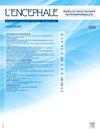Attention deficit hyperactivity disorder, self-esteem and the impact of treatments
IF 1.2
4区 医学
Q4 NEUROSCIENCES
Encephale-Revue De Psychiatrie Clinique Biologique et Therapeutique
Pub Date : 2024-12-01
DOI:10.1016/j.encep.2023.11.009
引用次数: 0
Abstract
Objectives
Children with attention deficit hyperactivity disorder (ADHD) experience repetitive failures in their school and social life and often receive negative feedback from their environment, endangering the development of their self-esteem. Self-esteem is a forecasting factor for social, psychological, professional and familial well-being. Poor self-esteem is a risk factor for the development of depression, anxiety disorder, and personality disorder. The aim of this article is to evaluate the child's self-esteem at the initial time of ADHD diagnosis, describe self-esteem evolution after diagnosis and identify clinical and therapeutic factors associated with improved self-esteem.
Methods
In a longitudinal descriptive study, 6–12-year-old patients with ADHD underwent a multidisciplinary evaluation including a diagnostic interview (Kiddie Schedule for Affective Disorders and Schizophrenia Present/Lifetime version: K-SADS), a symptoms severity assessment with parent questionnaires (Attention Deficit Hyperactivity Disorder Rating Scale: ADHD-RS), a neurocognitive testing of attention and IQ, and a self-esteem interview (Self-Esteem Inventory of Coopersmith: SEI). The follow-up assessment included a K-SADS-PL, ADHD-RS and SEI assessments and recorded treatment history. We compared the score of self-esteem between these two assessments.
Results
Among the 108 screened patients, we obtained complete data from 55 patients at the second assessment. At first evaluation, two-thirds of children with ADHD had low self-esteem scores. At the second evaluation, our results indicate a significant improvement of global, personal, and social self-esteem score (SEI) and symptoms severity score (K-SADS-PL and ADHD-RS).
Conclusions
Self-esteem improved in patients with ADHD after specific treatments.
注意缺陷多动障碍、自尊和治疗的影响。
目的:患有注意力缺陷多动障碍(ADHD)的儿童在学校和社会生活中屡遭挫折,经常从环境中得到负面反馈,从而危及其自尊心的发展。自尊是社会、心理、职业和家庭幸福的预测因素。自尊心差是导致抑郁症、焦虑症和人格障碍的危险因素。本文旨在评估儿童在确诊多动症初期的自尊心,描述确诊后自尊心的演变,并确定与自尊心改善相关的临床和治疗因素:在一项纵向描述性研究中,6-12 岁的多动症患者接受了多学科评估,包括诊断访谈(情感障碍和精神分裂症现在/终身版 Kiddie Schedule for Affective Disorders and Schizophrenia Present/Lifetime version:K-SADS)、带有家长问卷的症状严重程度评估(注意力缺陷多动障碍评定量表:ADHD-RS)、注意力和智商的神经认知测试以及自尊访谈(库珀史密斯自尊量表:SEI)。后续评估包括 K-SADS-PL、ADHD-RS 和 SEI 评估以及治疗史记录。我们比较了这两次评估的自尊得分:在 108 名接受筛查的患者中,我们在第二次评估时获得了 55 名患者的完整数据。在第一次评估中,三分之二的多动症儿童自尊心得分较低。在第二次评估中,我们的结果表明,总体、个人和社交自尊评分(SEI)以及症状严重程度评分(K-SADS-PL 和 ADHD-RS)均有显著改善:结论:经过特定治疗后,多动症患者的自尊心得到了改善。
本文章由计算机程序翻译,如有差异,请以英文原文为准。
求助全文
约1分钟内获得全文
求助全文
来源期刊
CiteScore
4.60
自引率
7.40%
发文量
162
审稿时长
6-12 weeks
期刊介绍:
Une revue française de renommée internationale.
- Un comite de rédaction représentant tous les aspects de la prise en charge psychiatrique du patient.
- Une sélection rigoureuse d''articles faisant l''objet de plusieurs expertises.
- Des travaux d''auteurs et de chercheurs de renommée internationale.
- Des indexations dans les grandes bases de données (Current Contents, Excerpta Medica, etc.).
- Un facteur d''impact qui témoigne de la grande notoriété de la revue.
La tribune des publications originales de haut niveau.
- Une très grande diversité des sujets traités, rigoureusement sélectionnés à travers des sommaires dynamiques :
- des éditoriaux de médecins référents,
- une revue de presse sur les actualités internationales,
- des articles originaux pour approfondir vos connaissances,
- des mises au point et des cas cliniques pour engager votre réflexion sur les indications et choix possibles au travers de mises en situation clinique,
- des dossiers thématiques pour faire le tour d''une question.
- L''actualité de l''AFPB : L''Encéphale publie régulièrement des comptes rendus de l''Association française de psychiatrie clinique.

 求助内容:
求助内容: 应助结果提醒方式:
应助结果提醒方式:


